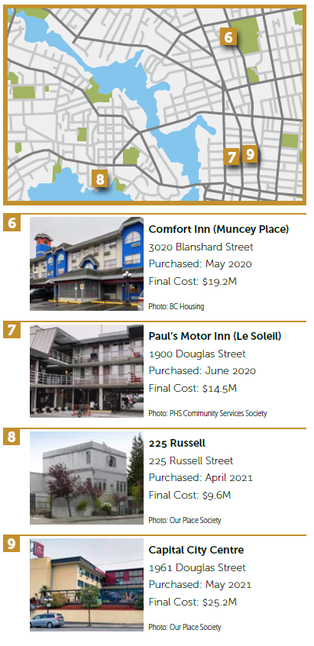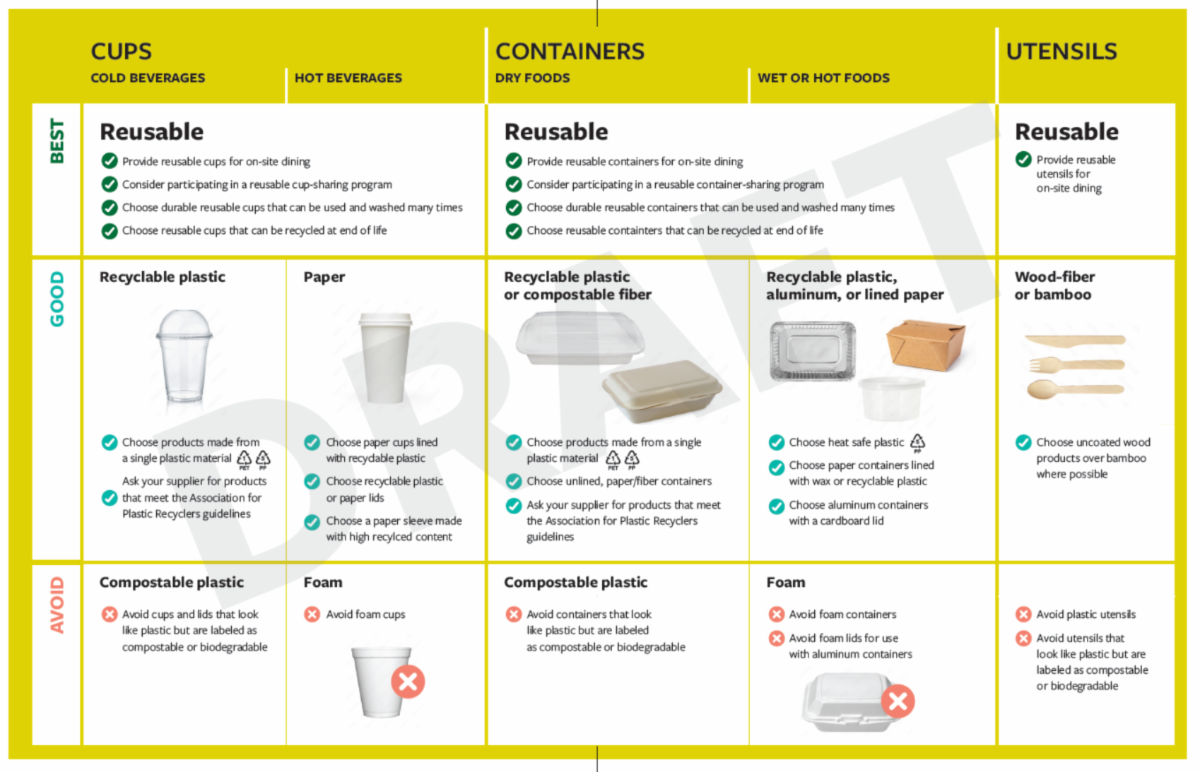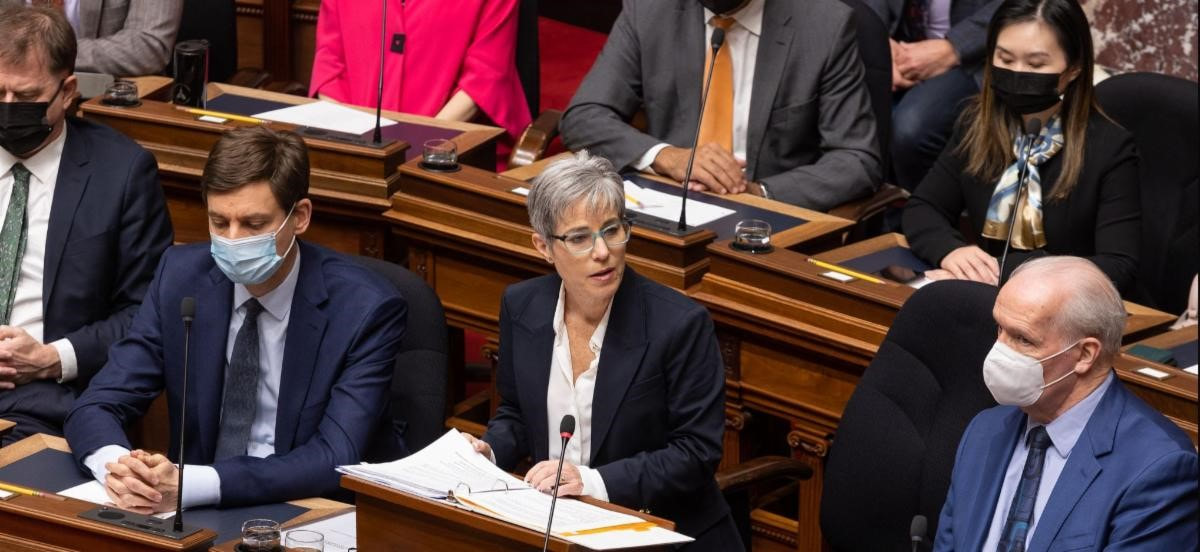|
The RapidBus service between the West Shore and downtown Victoria is expected to launch in early 2023. Construction on Douglas Street is ongoing, BC Transit said.
"RapidBus is transit service that outperforms the personal automobile in speed, comfort and reliability," states BC Transit's website. "It is connected, frequent, fast and reliable." The idea is to provide faster and more convenient transit to encourage more people to use the bus to commute. The goal is to go from 80,000 daily transit users today to 200,000 by 2038. The project is included in the BC Ministry of Transportation and Infrastructure's South Island Transportation Strategy, released in 2020. Better transit is one solution for improving transportation planning in Greater Victoria — something The Chamber continues to advocate for. The provincial government announced changes on Monday to the way certain property values are assessed. The move could potentially ease a burden faced by businesses whose property has been assessed based on its potential value. For example, a one-storey non-profit serving a downtown neighbourhood assessed as if it housed a high-rise condo resulted in massive unsustainable property tax increases.
The Chamber advocates for Fair Regulations, and we were successful in getting the province to review BC Assessment's "highest and best use" practice. The changes announced this week will allow municipalities to choose lower tax rates for select properties. Greater Victoria's housing market continues to become more balanced. The ratio of sales to active listings is at 28.14%. Real estate professionals consider a balanced market to be between 20% and 15%, Victoria Real Estate Board president Karen Dinnie-Smyth said.
“A high percentage means more of the available listings have sold, which shows a high buyer demand and that’s generally a favourable market for sellers," Dinnie-Smyth said. The benchmark value of a single family home in Greater Victoria's core was $1.39 million. That's down from $1.43 million in July, but up from $1.2 million last August. Municipal governments are responsible for services and infrastructure that have very real impacts on the daily lives of businesses in their community. Having good quality governance is critical to making sure money raised from taxes is well spent.
On Oct. 15, voters will have a chance to choose who will represent them on their municipal councils for the next four years. "This is an opportunity for individuals to take a look at the candidates and what they represent, and (ask if it's) in the best interest of you, your family, your business, your neighbourhood," Chamber CEO Bruce Williams told Global News. "So make sure you're voting for the right people." Exactly who your options are will be known by 4 pm on Sept. 9, as that's the deadline for candidates to put forward their nomination. For key dates in this year's civic elections, which includes voting in a new school board for your districts, check out this link. A Governance Review by MNP LLP has outlined a number of recommendations to improve the work being done by the City of Victoria council.
The report unveiled a high level of unhappiness with the job being done by council, with 81% of respondents saying they were dissatisfied (21%) or very dissatisfied (60%) with governance. "The Chamber supports positive change in governance to enable good business and great community for all. We commend the city for taking a long look in the mirror and hope that other municipalities do the same to find better efficiencies," Chamber CEO Bruce Williams said. "We agree with MNP's recommendations, which aim to keep meetings on track and more accessible to busy people who want to have a say in council's decisions." The report comes ahead of scheduled municipal elections in October, and The Chamber will reach out to the new council to encourage them to make positive changes. Concerns over inflation and the resulting increase in interest rates sparked by the Bank of Canada have worked to cool down housing sales in our region. The Victoria Real Estate Board's latest statistical analysis shows 35% fewer homes were sold in June compared to the same month last year. There are more listings on the market allowing it to settle into a more typical pace than the frenzied conditions experienced during the pandemic.
However, the benchmark value for homes continued to increase to $1,464,400 in June from $1,446,400 in May. "It may seem counterintuitive to continue to talk about the need for supply at a time when inventory is rising," VREB President Dinnie-Smyth said in a news release. "We must keep the conversation alive, and we urge all levels of government to continue to aggressively address the housing supply situation. We need more supply of all types of housing." A lack of housing supply is a major factor in the challenge many employers face finding and keeping workers. “We are always advocating for more affordable housing and housing supply, as well as security and sustainability in supply chains to get the needed materials in place to create housing,” Chamber CEO Bruce Williams told the Times Colonist. An initiative that started in the City of Victoria, was supported by business and took root across Greater Victoria is moving to the national stage. As of the end of this year, the federal government is banning the production or importation of single-use plastic bags, straws, stir sticks containers and other items that clog up landfills and contaminate natural ecosystems.
The Chamber worked closely with local governments on the initial regulations to ensure government followed innovations already being introduced by business. This helped the implementation unfold smoothly as the rules were a response to public demand as identified by businesses, ensuring success. The best way to address the seriousness of climate change is by supporting innovations led by business. Starting June 20, travellers will no longer be required to show proof of vaccination when boarding a plane or train in Canada. Federally regulated workers will also no longer need to reveal their vaccination status.
The federal government has opted to suspend the requirements, which could be reinstated if the COVID-19 situation changes. The change does not affect the steps that need to be taken by Canadians returning from international travel. As well, travelling to other countries requires following their entry rules, including proof of vaccination to enter the US. Federal vaccine mandates for travel were put in place on Oct. 30, 2021. Meanwhile, long lineups continue at Service Canada centres caused by people seeking to renew their passport. An additional 600 workers were hired this month to help alleviate the backlog as passport applications jumped. The federal government expects as many as 4.3 million applications over the next two years. Almost 1.3 million passports applications were processed between April 1, 2021, and March 31, 2022. That compares to 363,000 the previous year. The provincial government has launched a new BC Bid portal, making it easier for businesses to participate in procurement opportunities offered by hundreds of public sector organizations.
The single-point of access is used by school districts, municipalities, health authorities, Crown corporations and other government agencies to post contracts for goods and services across industries. Greater Victoria's business community is showing its resilience as a new report shows commerce continues to strengthen and grow.
“Despite headwinds facing the global economy, our region has roared back and we’re in a good position to really take flight as we welcome our traditional tourism season,” Chamber CEO Bruce Williams said. “These indicators make it clear that people can’t wait to get back to our vibrant downtown and enjoy all the amazing experiences our businesses provide.” The report shows that there were 314,730 more pedestrian trips to downtown Victoria in the first three months of 2022 than the same period last year. The City of Victoria issued 7,623 business licences in the first quarter of 2022, up from 7,187 in the same period in 2019 before the pandemic. The provincial government appears committed to its plan to rebuild the Royal BC Museum over the next eight years at a cost of $789 million. The museum was founded in 1886 and has been in its current location since 1968.
The Chamber will work to support businesses affected by the change, including attractions that now have an opportunity to increase their profile. “You can come downtown and go to the Bateman Gallery, you can go to the Bug Zoo, you can go to the Maritime Museum — there are still a lot of attractions around and plenty of things to do,” Chamber CEO Bruce Williams told CHEK News. “The work to modernize the Royal BC Museum is a legacy project that will enrich, inspire and continue to benefit British Columbians and Indigenous Peoples for generations to come," RBCM CEO Alicia Dubois said in the provincial news release. There are plans for travelling exhibitions, regional displays and an interactive walking tour in Victoria while the new museum is being built. It should be no surprise that a regional police force was one of the common themes of a long-awaited report from the Special Committee on Reforming the Police Act.
The report, released last week, noted that the City of Victoria and Township of Esquimalt are the only municipalities in BC that share a local police department. The report also stated that when the provincial government ordered the merger of the Esquimalt and Victoria police forces, the understanding at the time was that "this would be the first step towards regional integration of policing in the Capital Region, but this has not happened." The Chamber supports a regional police force in order to ensure limited resources are used as efficiently as possible to create Safe Communities for everyone in Greater Victoria. Open House tonight in Esquimalt Esquimalt hosted an Open House from 5:30-7:30 pm on May 4 in the gallery at Esquimalt Town Square to hear from residents about the Township's police model. “We want a dialogue with our community before making any large decisions about policing,” Esquimalt Mayor Barbara Desjardins said in a news release. “By joining the conversation about policing in Esquimalt, you will help us make crucial decisions that impact community safety, crime prevention and the use of your tax dollars.” Innovation led by business is key to tackling climate change and The Chamber is committed to working with all levels of government to help them understand how the private sector is providing real solutions to meet public demand. The City of Victoria has designated staff to work on ensuring food service businesses are using the most sustainable materials available.
City staff have developed a Draft PDF of a Sustainable Takeout Guide that they hope will help businesses. Staff have also asked The Chamber for feedback on the city’s plan. The Chamber worked closely with the city on plastic bags regulations holding a roundtable of city staff and business owners to identify what was already working, what could be efficiently implemented and the tools needed to do so. As a result, the regulation was welcomed by most businesses and served as a model for municipalities across the region. The District of Saanich is the second municipality in BC to fast-track affordable housing. On Monday night, Saanich Council unanimously approved a motion to accept the streamlined process adopted earlier this month by the City of Victoria.
The decisions will streamline the approval of development proposals as long as they fit with each municipality's Official Community Plan. This will help increase the supply of homes for workers in our region — vital to finding and keeping the staff needed for employers achieve their economic potential. As municipal councils across the region finalize tax rates for business properties, The Chamber wants to hear from any members facing unfair increases.
“Businesses need to plan for expenses, and they expect to be treated fairly. After all, the long-term health of our communities is directly related to the health of our small businesses,” Chamber CEO Bruce Williams told the Times Colonist. “The Chamber is reaching out to our members to see how (tax increases) affect them individually, and we’ll take that information forward to candidates in the fall municipal election.” The Chamber recognizes that municipalities must juggle a number of variables when setting rates. Ultimately, each municipality determines how much money they need to deliver services to their citizens and then set rates to raise the revenue to cover most of those costs. Whether an individual property experiences an increase in their tax bill typically depends on whether the property had a higher-than-average increase in value. However, municipalities also need to be fair when allocating costs to commercial properties. “The business community understands that taxes are a tool used by local governments to provide services, but we’re always watchful of councils who try to shift costs to business and industry and away from residents for political reasons,” Williams said, noting that now is not the time for municipalities to be increasing costs for any taxpayers. “Many businesses are still facing challenges, so any tax increase will weigh on them at a time when we need our economy to take flight.” Employers have a little more clarity about the new requirement for five days of paid sick leave. On Monday, BC's Labour Minister Harry Bains said the requirement is for every "calendar year" of employment, regardless of an employee's start date.
As well, the government amended language relating to collective agreements so that no employees are excluded. The Chamber continues to collect feedback from the business community about the introduction of paid-sick days in BC. Let us know your experiences to help inform our advocacy efforts by emailing [email protected]. The long-delayed Citizens' Assembly looking into merging the District of Saanich and the City of Victoria is going ahead.
“We have all agreed to each contribute $250,000, for a total of $750,000, toward the cost of a citizens’ assembly and to explore the possible outcomes, costs, benefits and disadvantages of amalgamation so that residents have a more complete understanding of what amalgamation may involve," said a statement issued by the three parties. However, citing challenges with gathering in person during the pandemic, the process has been bumped back until after the Oct. 15 civic elections. "We recognize there are strong opinions regarding amalgamation, and we want to ensure people have an opportunity to provide input in an open forum and a subsequent decision is well-informed and evidence-based, the statement said." One of BC's often overlooked economic sectors is getting a closer look. The province has contracted a Labour Market Study of the non-profit sector, which includes about 29,000 organizations employing 86,000 people and generating $6.7 billion in economic activity.
In the early months of the pandemic, the Victoria Foundation was part of a group of organizations that worked together to report on how non-profits were faring. They found that organizations focused on helping arts and culture and sports and recreation had reduced revenue, while those in the health and social services sectors were in high demand. The 20-month study is being conducted by Vantage Point at a cost of $290,000.  In the early days of the pandemic, BC Housing made a number of purchases of hotels and other properties to house people experiencing homelessness. The deals cost taxpayers a total of $221 million, raising questions from people concerned about the expense. Those questions were answered this week by the Office of Auditor General of BC, which released its audit of the purchases. "BC Housing met all relevant approvals and policy requirements for the purchases of nine properties in Vancouver and Victoria in 2020 and 2021," the report concludes. "BC Housing obtained market value appraisals for all nine properties as required by internal policies and procedures. The total of the purchases ($202.4 million) was 8.5% below the total appraised market values ($220 million) for the nine properties." Within Victoria, properties purchased by BC Housing include the former Comfort Inn at 3020 Blanshard St., Paul's Motor Inn at 1900 Douglas St., Capital City Centre at 1961 Douglas St. and a housing project at 225 Russell St. Housing affordability for many Greater Victoria employees has become even more strained in recent months as the cost of renting increased by 3.1% and the vacancy rate dropped to about 1%.
With more people choosing to move to our region, the demand for new housing is putting intense pressure on our ability to add to the supply. The Canadian Mortgage and Housing Corporation’s Rental Market Survey Data Tables for Greater Victoria shows that a total of eight private apartments were added in the City of Victoria between October 2020 and October 2021. A further 643 were added in all other Greater Victoria municipalities during the same time. Meanwhile, the region's population increased by 29,467 between the 2021 and 2016 censuses. BC Minister of Finance Selina Robinson met with Greater Victoria Chamber of Commerce members today to address your questions about the province's 2022 Budget, unveiled yesterday.
Minister Robinson expects economic growth even as provincial debt increases. This year's $71 billion budget is forecast to have a deficit of $5.5 billion, followed by a $4.2 billion deficit in 2023/24. Robinson said the main reasons for the deficits are the anticipated costs of rebuilding damaged transportation infrastructure to withstand future climate events. Asked whether the province planned to ease the burdens of the EHT — which took $207 million more than anticipated from BC employers last year — or paid sick days, the minister defended the government's current policies. She also acknowledged concerns about linking the minimum wage to inflation and said she will work to make the change as smooth and predictable as possible for business. Budget Notes: Greater Victoria is getting two complex care facilities, though specific locations were not announced. The budget also includes $84 million over three years for planning and capital funding for upgrading the Belleville Terminal. The tourism sector has been allocated $25 million to help with recovery efforts, though a further $915 million was set aside for potential pandemic-related expenses, including health care costs or economic recovery funding. Greater Victoria is also in line for numerous “bus and shoulder” expansions to improve regional transit, and money has been earmarked for the transit hub at Uptown in Saanich. “The Chamber has long advocated for child care as an investment in our economy, and we applaud the province’s commitment to adding 40,000 new spaces within seven years. We also are encouraged by some of the steps to address our lack of housing supply,” Williams said. Our region's numerous police forces are moving in the right direction with the establishment of the Regional Governance Council for Integrated Police Units. The new body will have limited authority, but will help municipalities better understand how they can benefit from shared services. The council will consist of mayors from Greater Victoria, and will be co-chaired by David Screech, Mayor of the Town of View Royal, and Kevin Murdoch, Mayor of the District of Oak Bay.
The Chamber continues to call on the provincial government to contribute its portion of costs for a Citizens' Assembly. In the last civic elections, voters in the District of Saanich and City of Victoria mandated their councils participate in the process. Both municipalities are now waiting for the province before they can begin the next phase. Some big changes are coming to the auto insurance industry in BC. On Monday, ICBC announced that customers with policies expiring on or after May 1, can renew online. The system will actually be available March 17 for people who want to renew early.
Also starting May 1, drivers will no longer need to display an updated insurance decal on their licence plate. BC is expanding the Automated Licence Plate Recognition program, which helps law enforcement detect unlawful, unlicensed and uninsured drivers. According to numbers released today, almost 30,000 people have moved to Greater Victoria since 2016. This influx has added tremendous stress on housing supply in our region.
It's a big reason why The Chamber encourages efforts such as the District of Saanich's recently adopted 10-year Housing Strategy. Saanich council has approved a four-year funding plan that will help the municipality address housing needs. As the largest and most populous municipality in our region, Saanich's leadership is key to making sure we have a plan that will alleviate pressure on the housing market. A survey of Greater Victoria businesses will gather data to help better understand challenges facing the region's economy in 2022. The survey, launched by the South Island Prosperity Partnership, is open until Feb. 11 and takes less than 10 minutes to fill out. Questions range from what your experiences have been with supply-chain disruptions to various affordability concerns, including housing supply.
The results of the survey will be used by industry and business associations, including The Chamber, to help our advocacy efforts with government. |
Categories
All
|
Copyright © 2021 Greater Victoria Chamber of Commerce. All rights reserved.
#100 – 852 Fort St., Victoria, BC V8W 1H8, Canada | Phone: (250) 383-7191
[email protected] | Site Map
#100 – 852 Fort St., Victoria, BC V8W 1H8, Canada | Phone: (250) 383-7191
[email protected] | Site Map
Notice a typo or broken link? Please let us know so we can fix it ASAP. Email [email protected]



